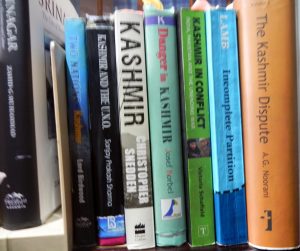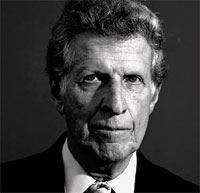Peace Watch » Editor's Take, Featured » A Word with “Cocooned” Historiographers of Kashmir.
A Word with “Cocooned” Historiographers of Kashmir.
A word with Historiographers
It was 26 March 2013, Sheikh Mohammad Usman, one of the leading publishers of Srinagar had passed away. A motley group of historians and writers had come for the condolence to his residence in Bemina. It was a sunny forenoon, outside the house of the bereaved family five of us Dr. Abdul Ahad, Professor Mohammad Ishaq Khan, M. Ashraf, Dr. Javid Iqbal and I got involved in a discussion- a serious discussion:
Our story is not known to the world as that of the Palestine. Our problem is as old as that of the Palestine. Both continue to be on the UN agenda as unresolved problems. One is disappointed to see no book on the Kashmir Dispute on display in leading bookstores in the West like Barnes & Noble, Kinokuniya, Lutyens & Rubinstein, and London – Hatchards like that of Edward Said’s, the ‘Question of the Palestine.’ Said’s book has been sold in millions, and it undoubtedly introduced the Palestine problem to people in the West- as a grave human problem. The Turks know about Kashmir in bits and pieces, but elite in Arabia are as ignorant about Kashmir (a nuclear flashpoint in South Asia) as Bedouins. Not to speak of newspapers in Arabian language Kashmir ‘intifada’ was of no news value for major Arab newspapers like the Arab News or the Saudi Gazette. Except for opinion columns by Tariq A. Al-Maeena- these newspapers had maintained inexcusable silence.
Caught up in a maze of questions, Why Kashmir has not become a popular discourse in the West. The only answer we could find for these questions was that unless, our historians and writers objectively tell the story of the land to the world, demolish the hegemonic discourses’ it will be hard to make the world believe that ours is a just cause. Two amongst us, Dr. Abdul Ahad and Prof. Ishaq Khan were historians- having created a niche for themselves in the pantheon of historians. Prof. Ishaq Khan had written about a dozen of books on varied subjects. Nonetheless, internationally he is quoted for his book ‘Kashmir’s Transition to Islam: The Role of Muslim Rishis.’ Notwithstanding, recognized in the world of academia as a respected historian on the socio-religious history of Kashmir he carried the guilt as a Kashmiri of not having written a book on the Kashmir Dispute. In his departing note, he promised us that now he will commit himself to writing a book on the Kashmir Dispute, forcefully focussing on the Kashmir after the nineties. Just after six days he died of cardiac arrest and could not realize his dream project- may his soul rest in peace.
 The objective for narrating the incident is reminding the whole brigade of history teachers-cum-historians in the campuses and colleges about their obligations for documenting the contemporary history of their land. The truth is, so far it has been the American and European historians like Christopher Snedden, Alastair Lamb, Victoria Schofield, Stanley Wolpert, Robert Wirsing, Sumantra Bose and others who have been telling the Kashmir story to the world. Some candidly and some from their respective perspectives- but hardly a comprehensive book on the Kashmir Problem by a Kashmiri has so far reached to the international readership.
The objective for narrating the incident is reminding the whole brigade of history teachers-cum-historians in the campuses and colleges about their obligations for documenting the contemporary history of their land. The truth is, so far it has been the American and European historians like Christopher Snedden, Alastair Lamb, Victoria Schofield, Stanley Wolpert, Robert Wirsing, Sumantra Bose and others who have been telling the Kashmir story to the world. Some candidly and some from their respective perspectives- but hardly a comprehensive book on the Kashmir Problem by a Kashmiri has so far reached to the international readership.
There are two reasons why I plead before our historians in the campuses to come out of ‘the medieval period and Sufism’- the ‘safe-writing- syndrome,’ and document the contemporary Kashmir story. One, because in the academic world writings by historiographers and university professors are recognized more authentic than those by generalists or journalists. Two, the story of mayhems and bloodbaths told by the Western authors are brief and sometimes too sketchy. Had our historiographers committed to documentation the bloodbath of 21 January 1990, in which 52 unarmed civilians were killed and hundreds wounded with bullets, in Jallianwala Bagh style, it would have got etched in the collective memory of the international community as the Black Sunday of Kashmir? The 6 January 1990 Sopore carnage in which forty people were shot and burnt to death and hundreds wounded gruesomely would have found a permanent place in the international human rights narrative. The Time Magazine had described this massacre as “Blood Tide Rising in Kashmir.” Similarly, the Intifadas of 2008, 2010 and 2016 comparable to any successful non-violent resistance movement in the world for lack of proper documentation and propagation are yet to shake the right thinking intelligentsia and intellectuals across the globe as had happened during the Palestine Intifada or South Africa’s anti-apartheid movement. 
True, a large section of academia is yet to exorcise itself from “remaining in good-books-syndrome” for their foreign jaunts, career advancements or securing jobs for their wards in the universities. Nonetheless, some of them have a genuine point that research and documentation are not done in the air. These need sponsorship, support and proper institutionalization for which our society is not yet ready. It is true if the Institutions like Brooking had not supported scholars like Stephen Cohen works like ‘the Idea of Pakistan or India Emerging Power would not have seen the light of the day or Akbar S Ahmed would not give three monumental studies on Islam. Had not authors been funded by independent American and European funding institutions even some important works on Kashmir by Indian and foreign authors could not have been written at all? In the early nineties, the idea of institutionalization of the documentation and conducting of research had taken a concrete shape in Kashmir with the birth of the Institute of Kashmir Studies, with its management and control under the Jammat-I-Islamia. Instead of growing as independent Kashmir related institute it ended up as an outfit for the organization thus failed to take off and died a premature death.
True, for garnering the opinion of the intelligentsia in India and world over for ending uncertainty in the State there is a need for institutionalization of documentation and popularization of the people’s discourse- an effort needs to be made. In situations where institutionalization is made possible by powers that be, scholars with sincerity of purpose and commitment can reach out to the world through microblogs and social media and writing tracts and treatises.
PUBLISHED IN GREATER KASHMIR ON 23-01-2017
Filed under: Editor's Take, Featured







